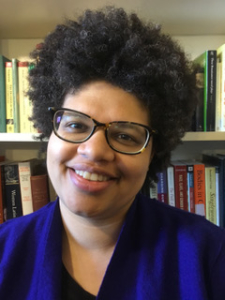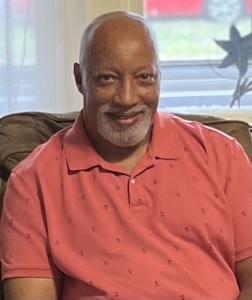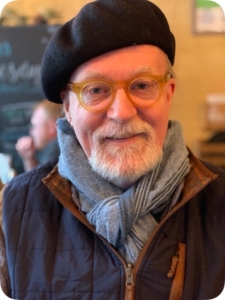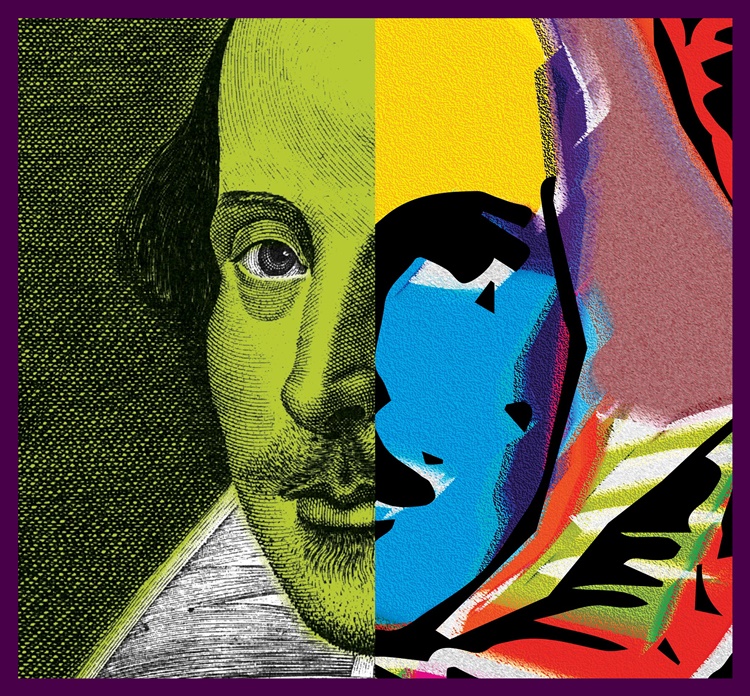Dr. Patricia Akhimie ~ Director of the Folger Institute
 Patricia Akhimie is Director of the Folger Institute at the Folger Shakespeare Library. She is also the Director of the RaceB4Race Mentoring Network and Associate Professor of English at Rutgers University-Newark, where she teaches Shakespeare Renaissance drama, and early modern women’s travel writing. She is the author of Shakespeare and the Cultivation of Race: Race and Conduct in the Early Modern World (Routledge 2018). She is co-editor, with Bernadette Andrea of Travel and Travail: Early Modern Women, English Drama, and the Wider World (University of Nebraska Press 2019). She is currently at work on a new edition of Othello for the Arden Shakespeare 4th series, and a monograph about race, gender, and editing early modern texts. In 2021 she received the Warren I. Susman Award for Excellence in Teaching from Rutgers University for outstanding and innovative performance in both the physical and virtual classroom. Her research has been supported by the National Endowment for the Humanities, the Folger Shakespeare Library, the John Carter Brown Library, and the Ford Foundation.
Patricia Akhimie is Director of the Folger Institute at the Folger Shakespeare Library. She is also the Director of the RaceB4Race Mentoring Network and Associate Professor of English at Rutgers University-Newark, where she teaches Shakespeare Renaissance drama, and early modern women’s travel writing. She is the author of Shakespeare and the Cultivation of Race: Race and Conduct in the Early Modern World (Routledge 2018). She is co-editor, with Bernadette Andrea of Travel and Travail: Early Modern Women, English Drama, and the Wider World (University of Nebraska Press 2019). She is currently at work on a new edition of Othello for the Arden Shakespeare 4th series, and a monograph about race, gender, and editing early modern texts. In 2021 she received the Warren I. Susman Award for Excellence in Teaching from Rutgers University for outstanding and innovative performance in both the physical and virtual classroom. Her research has been supported by the National Endowment for the Humanities, the Folger Shakespeare Library, the John Carter Brown Library, and the Ford Foundation.
The Goodness of the Night: Editing Othello
- Through a close look at versions of and emendations to Othello, Dr. Patricia Akhimie’s talk brings the practice and theory of textual editing into conversation with premodern critical race studies and explores the role of textual editing in the production and perpetuation of racial stereotypes. Beyond the homogenizing work that textual editors’ own homogenous demographics have and continue to affect, as a practice, textual editing employs strategic omissions and emendations, constructing a bibliographic architecture designed to preserve editorial thought and occlude the lived experience of readers. This practice privileges a long record of internal conversations amongst editors that gestures continually backward toward a (nonexistent) original moment when editors, texts, and authors were one, knowing each other fully. At the same time, it preserves the function and may redouble the effect of racist words, phrases, and ideas that appear in the text and editorial apparatus, words that function to “know” and identify others as different and lesser in the text, on the stage, and in the world. In this talk I seek to demonstrate the race-making work of textual emendation and omission with the goal of empowering a more diverse set of readers and thinkers to engage with the text by engaging with the theory and practice of textual editing.
Dr. Amrita Dhar ~ The Ohio State University
 Amrita Dhar is a literary and cultural historian, and Assistant Professor of English at The Ohio State University, where she researches and teaches courses in early modern studies, disability studies, postcolonial studies, and migration studies. She has written on a range of topics, including John Milton’s blind poetics, premodern critical race studies and Shakespeare, social histories of mountaineering, and social justice pedagogy, for both academic and popular venues. She is currently completing her first monograph, Milton’s Blind Language, which examines the workings of blindness towards the making of John Milton’s last long poetry. Her next book project, Crossings of Disability, Race, and Empire in the Early Modern World, examines the relationship between the cultural production of disability and the intertwined phenomena of early global contact, race-making, and belonging.
Amrita Dhar is a literary and cultural historian, and Assistant Professor of English at The Ohio State University, where she researches and teaches courses in early modern studies, disability studies, postcolonial studies, and migration studies. She has written on a range of topics, including John Milton’s blind poetics, premodern critical race studies and Shakespeare, social histories of mountaineering, and social justice pedagogy, for both academic and popular venues. She is currently completing her first monograph, Milton’s Blind Language, which examines the workings of blindness towards the making of John Milton’s last long poetry. Her next book project, Crossings of Disability, Race, and Empire in the Early Modern World, examines the relationship between the cultural production of disability and the intertwined phenomena of early global contact, race-making, and belonging.
She is also the founder and director of the multi-year collaborative project “Shakespeare in the ‘Post’Colonies,” which is producing three distinct publications: a set of open-access digital interviews with leading postcolonial Shakespearean creatives from around the world; a collection of essays from Bloomsbury entitled Shakespeare in the “Post”Colonies: Legacies, Cultures and Social Justice; and a journal special issue of Borrowers and Lenders: The Journal of Shakespeare and Appropriation on the topic of “Shakespeare in Bengal.”
Amrita is also an active climber and mountaineer and writes on world mountaineering literatures.
Making Aliens, Making Love: Shakespeare, Migration, Disability, and Citizenship
- Dr. Amrita Dhar’s paper will consider questions of migrancy, citizenship, alien-ness, and love using two Shakespeare texts and two of their twenty-first-century adaptations: one in film, another in theatre. It will focus on Romeo and Juliet together with A Different Romeo and Juliet (a 2016 film collaboratively created by the BBC and Dhaka Theatre, with a cast of performers with disabilities), and Othello together with Tonderai Munyevu’s play The Moors (a Methuen Drama Plays for Young People publication; Bloomsbury, 2020) to explore the uses of Shakespeare’s texts towards the creation or upholding of rights for marginalized populations today versus the suppression and/or obliteration of rights for those populations. The paper will also reflect on the matter of a peculiar white-saviour-ism that may be un-detachable from the legacy of Shakespeare today, while affirming that Shakespeare’s plays are ours now, and that what we do with them today will determine what happens to Shakespeare, and to us, going forward.
Sammie Byron ~ Shakespeare Behind Bars
 Sammie Byron is a Founding Member of Shakespeare Behind Bars at the Luther Luckett Correctional Complex in LaGrange, Kentucky. During his ten years with Shakespeare Behind Bars (1995-2005) Sammie played 20 of Shakespeare’s characters, including: Proteus in Two Gentlemen of Verona (1996); Maria & Priest in Twelfth Night (1997); Othello in Othello (1999); Aaron in Titus Andronicus (2001); Polonius & First Gravedigger in Hamlet (2002); Trinculo in The Tempest (2003). Sammie appears in Philomath Films award-winning documentary, Shakespeare Behind Bars, which follows the 2003 SBB production of The Tempest from the first day of rehearsal through the conclusion of the tour of the production to other Kentucky prisons. Sammie is employed full-time with Goodwill Industries as a Youth Training Facilitator working with young adults 16-24 years of age. Sammie teaches Developing Soft Skills. The course is designed to equip participants with social standards to enhance quality performance in workplace environments, as well as inspire value systems that are worthwhile, realistic, and attainable.
Sammie Byron is a Founding Member of Shakespeare Behind Bars at the Luther Luckett Correctional Complex in LaGrange, Kentucky. During his ten years with Shakespeare Behind Bars (1995-2005) Sammie played 20 of Shakespeare’s characters, including: Proteus in Two Gentlemen of Verona (1996); Maria & Priest in Twelfth Night (1997); Othello in Othello (1999); Aaron in Titus Andronicus (2001); Polonius & First Gravedigger in Hamlet (2002); Trinculo in The Tempest (2003). Sammie appears in Philomath Films award-winning documentary, Shakespeare Behind Bars, which follows the 2003 SBB production of The Tempest from the first day of rehearsal through the conclusion of the tour of the production to other Kentucky prisons. Sammie is employed full-time with Goodwill Industries as a Youth Training Facilitator working with young adults 16-24 years of age. Sammie teaches Developing Soft Skills. The course is designed to equip participants with social standards to enhance quality performance in workplace environments, as well as inspire value systems that are worthwhile, realistic, and attainable.
Curt L. Tofteland ~ Shakespeare Behind Bars
 Curt L. Tofteland is the founder of the internationally acclaimed Shakespeare Behind Bars program, now in its 28th year of continuous operation. From 1995-2008, Curt facilitated the SBB/KY program at the Luther Luckett Correctional Complex in LaGrange, Kentucky. During his thirteen-year tenure, Curt produced and directed fourteen Shakespeare productions. SBB is the subject of an award-winning documentary by Philomath Films. Curt was the Producing Artistic Director of Kentucky Shakespeare Festival from 1989-2008. During his twenty-year tenure, Curt produced fifty Shakespeare productions, directed twenty-five Shakespeare productions, and acted in eight Shakespeare Productions. As a professional director and an Equity actor, Curt has 200+ professional productions to his credit. Additionally, he has presented 400+ performances of his one man show Shakespeare’s Clownes: A Foole’s Guide to Shakespeare. Currently, Curt lives and continues his work with Shakespeare Behind Bars in Western Michigan. He has created a series of new programs under the title Shakespeare BEYOND Bars for post-incarcerated and marginalized populations beyond the razor-wire.
Curt L. Tofteland is the founder of the internationally acclaimed Shakespeare Behind Bars program, now in its 28th year of continuous operation. From 1995-2008, Curt facilitated the SBB/KY program at the Luther Luckett Correctional Complex in LaGrange, Kentucky. During his thirteen-year tenure, Curt produced and directed fourteen Shakespeare productions. SBB is the subject of an award-winning documentary by Philomath Films. Curt was the Producing Artistic Director of Kentucky Shakespeare Festival from 1989-2008. During his twenty-year tenure, Curt produced fifty Shakespeare productions, directed twenty-five Shakespeare productions, and acted in eight Shakespeare Productions. As a professional director and an Equity actor, Curt has 200+ professional productions to his credit. Additionally, he has presented 400+ performances of his one man show Shakespeare’s Clownes: A Foole’s Guide to Shakespeare. Currently, Curt lives and continues his work with Shakespeare Behind Bars in Western Michigan. He has created a series of new programs under the title Shakespeare BEYOND Bars for post-incarcerated and marginalized populations beyond the razor-wire.
Othello’s Tribunal
- In 1999, Sammie Byron, a founder of the Shakespeare Behind Bars Program at the Luther Luckett Correctional Complex in LaGrange, Kentucky chose to play Othello in the annual SBB production. In 2011, Curt L. Tofteland, Founder of Shakespeare Behind Bars, began working with Sammie on his memoir, one-person play – Othello’s Tribunal. In 2012, Sammie premiered Othello’s Tribunal while he was incarcerated at the Green River Correctional Complex in Central City, Kentucky. In 2014, Sammie was paroled from prison after serving thirty-one consecutive years of a LIFE sentence. As a returned citizen, Sammie and Curt continued to work on rewrites of Othello’s Tribunal. In 2018, Curt and Sammie launched Othello’s Tribunal Give Back Tour.
- To date, the Give Back Tour has performed at the Rome Shakespeare Festival in Rome, GA; Shakespeare in Prison Network Conference at the Old Globe Theatre in San Diego, CA; Shakespeare Tavern in Atlanta, GA; Hope College in Holland, MI; Little Sandy Correctional Complex, Sandy Hook, KY; Illinois Youth Center, Chicago, IL; The Spot, Goodwill Industries, Louisville, KY; Save Our Children Network, Louisville, KY; Roederer Correctional Complex, LaGrange, KY; Northpoint Training Center, Burgin, KY.
